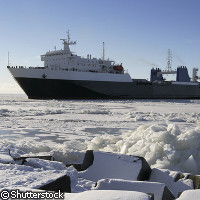As melting ice opens up Arctic shipping routes, pollution and safety measures needed
One of the likely consequences of climate change to the north of Europe is increased shipping in and around the Arctic, as the receding ice opens up new routes and passages around the region. On a recent trip to northern Norway, CORDIS News spoke to scientists, policy makers and other stakeholders about the impacts of shipping on the fragile Arctic environment and found out what can be done to mitigate these impacts. The Arctic is warming faster than the rest of the world, and satellite images reveal that the extent of the summer sea ice in the Arctic has declined by 8.9% per decade since the late 1970s. Furthermore, the rate of decline is increasing, and some scientists predict that the Arctic could be ice free in summer in just a few years time. In 2005, the Northeast Passage, which runs across the top of Russia, was opened up for the first time. Two years later, the Northeast Passage remained closed but the Northwest Passage across the top of North America opened up. Finally, in 2008, both passages opened up at the same time. These routes linking the Atlantic and Pacific Oceans could reduce transport routes by some 40%, raising the prospect of large numbers of cargo ships circumnavigating the North Pole in summer. The opening up of the Arctic has not gone unnoticed by oil companies. Work is already underway to exploit the rich oil and gas fields in the Barents Sea and on Russia's Yamal Peninsula. 'By 2010, 147.8 million tonnes of oil will be shipped out of northwest Russia, and a lot of this will sail past the Norwegian coast,' commented Oddgeir Danielsen of the Norwegian Barents Secretariat in the Norwegian town of Kirkenes, which lies close to the border with Russia. In contrast, in 2002, just over 5 million tonnes of oil left the region. Norway has already moved shipping lanes away from its coast to give it more time to react in the event of an oil spill. 'We went to the IMO [International Maritime Organisation] a couple of years ago and lifted the sailing lanes a bit further north of Norway to increase the warning time in case of an accident,' Norway's Foreign Minister, Jonas Gahr Støhre, told CORDIS News. The country has also established a National Knowledge Centre for sustainable Arctic transport and logistics in Kirkenes and a maritime traffic control centre in nearby Vardø. Oil spill alerts could well come from the Norwegian company KSAT (Kongsberg Satellite Services), which provides a range of support services for a large number of satellites. It uses data from synthetic aperture radar (SAR) satellites to detect oil spills, exploiting the fact that oil reflects radar signals in a different way to open water. A major advantage of SAR is that it works through clouds and at night. In addition to detecting major oil spills, KSAT is also able to spot bilge dumps, during which ships pump a mix of ballast water and oil into the water. Greater numbers of tourists could also travel to the far north, drawn by the Arctic's spectacular land- and seascapes. The lack of search and rescue services in the Arctic is a major problem in this respect. A ship carrying tourists recently ran into rocks off Svalbard as it attempted to draw near to the coast and provide its passengers with close up views of the shore. According to Nalan Koç, a researcher at the Norwegian Polar Institute in Tromsø, Norway, maps of the Arctic are not always very good and many ships travelling to the region are not designed to cope with hitting an iceberg, for example. This last point is particularly important; according Alf Håkon Hoel, a geopolitical researcher at the University of Tromsø. 'The Arctic will not be ice-free, but ice-infested, so it will be hard to establish regular traffic,' he explained. Knowing where ice is and how thick it is presents a serious problem for ships, even icebreakers able to withstand relatively thick ice. Put simply, it is much quicker and takes less energy to travel through open water than to break open a passage through thick ice. KSAT has recently launched an ice-navigation service that provides ships with real-time, high-resolution data on ice in a given area. With this information, captains can easily identify the quickest, easiest route through the ice, saving both time and fuel. The Norwegian Coastguard is already using this service and trials in the Baltic indicate that it could cut journey times through ice by 20%. Meanwhile, Nalan Koç is concerned that increased traffic in the Arctic could in itself accelerate the loss of the ice pack. She is involved in a project measuring the impact of soot on the reflectance of the ice. At the moment, fine particles of soot are carried up to the Arctic from Europe and Russia and are deposited on the ice. This makes the surface of the ice darker, causing it to absorb more heat from the sun's rays. Soot particles in the fumes from ships travelling in the Arctic will land directly on the ice, exacerbating the problem. 'This will hasten the melting of the ice,' she warns. Meanwhile, Norway's Foreign Minister is clear that research is essential to the future of the Arctic. 'Research and knowledge is the key to the Arctic,' he said emphatically. 'Our data is too limited and not comprehensive enough, so there's a massive research task ahead of us; it's very challenging and very exciting. 'The International Polar Year has seen major efforts to increase our knowledge. I think our ambition has to be to see to it that the end of the International Polar Year does not mean the end to the effort to promote research,' he concluded.
Countries
Norway



